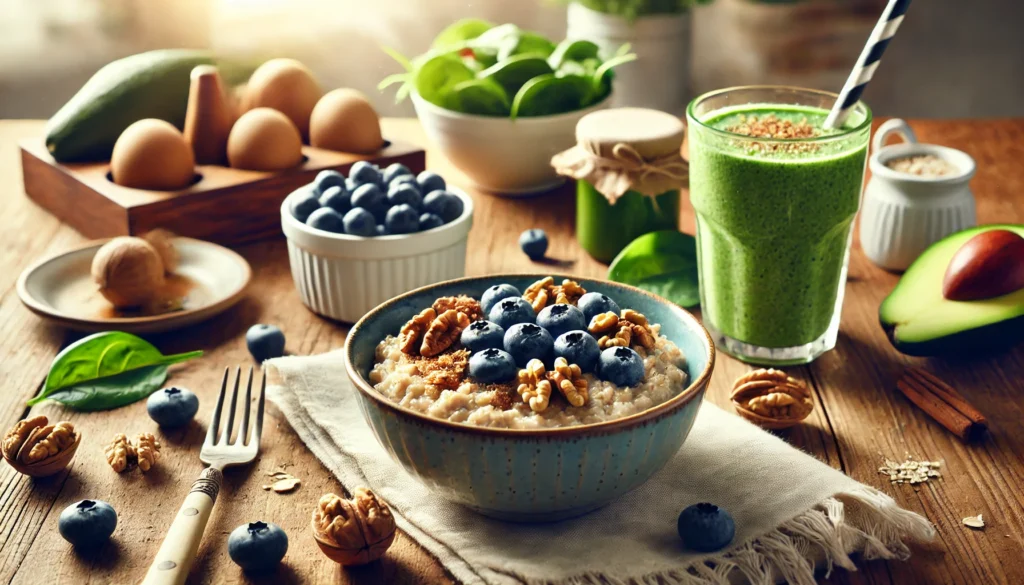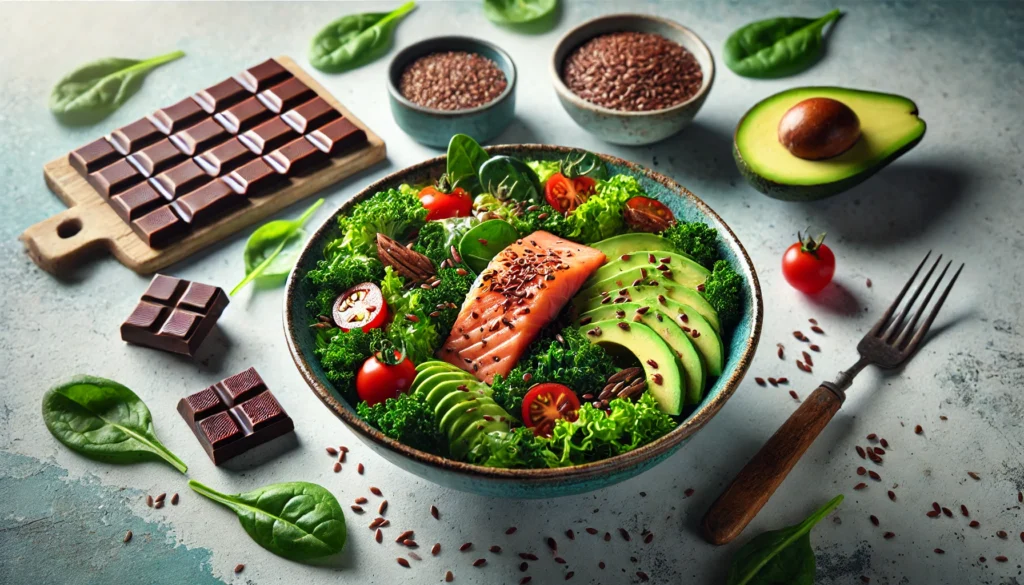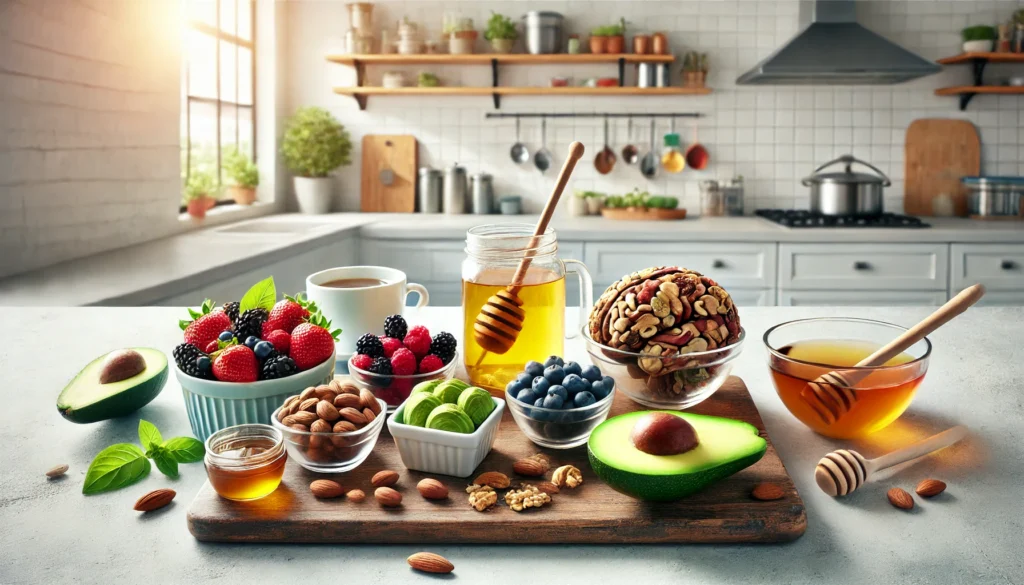The brain is a powerhouse. It’s responsible for every thought, action, memory, and feeling. To function optimally, it requires a steady supply of energy and specific nutrients.
But what fuels this complex organ?
The answer lies in our diet. Certain foods, often referred to as “brain foods,” are particularly beneficial for brain health. They can enhance cognitive function, improve focus, and even slow down the brain’s natural aging process.
In this article, we’ll delve into the top 10 brain foods for optimal health. We’ll explore how these foods contribute to mental acuity and how they can be incorporated into your daily diet.
We’ll also address common questions and misconceptions about diet and brain function. Does diet really affect your alertness? Can certain foods help you concentrate better?
Whether you’re a health and wellness coach, a science journalist, or a biohacker, this comprehensive guide will provide you with the information you need.
So, let’s embark on this journey to discover the best foods for your brain.
You may also like: Top Foods to Enhance Your Memory
Understanding Brain Foods and Cognitive Health
Cognitive health is crucial for daily functioning. It affects memory, concentration, and problem-solving. Brain foods play a significant role in maintaining this health. They provide essential nutrients that support brain function and promote neural connections.
A variety of nutrients are needed for optimal brain function. These include omega-3 fatty acids, antioxidants, vitamins, and minerals. They help the brain to perform efficiently.
Here’s what brain foods can offer:
- Support neural growth: Certain foods enhance the growth of new neurons.
- Protect brain cells: Antioxidants help protect against cell damage.
- Enhance communication: They improve the way neurons communicate.
- Boost energy: They provide sustained energy, crucial for prolonged mental tasks.
Brain foods impact more than memory or focus. They also affect mood and mental well-being. Some foods can reduce inflammation, which is linked to depression.
Understanding how nutrition impacts brain health requires knowledge of food composition. Foods rich in healthy fats, like omega-3s, are particularly beneficial. They make up a large part of brain cell membranes.
In essence, the interplay between diet and brain function is a dance of nutrients. These nutrients ensure that your brain remains sharp and resilient. A balanced intake of brain foods is key to unlocking cognitive potential.
The Role of Nutrition in Brain Function
Nutrition shapes brain function in profound ways. Nutrient-rich foods provide the foundation for cognitive processes. Essential nutrients like fatty acids build cell membranes. Vitamins and minerals support cellular repair and neurotransmitter function.
Omega-3 fatty acids, found in foods like salmon, are essential. They are pivotal in learning and memory. Antioxidants like those in berries protect brain cells from oxidative stress. This stress can lead to cognitive decline over time.
The nutrients you consume influence brain function daily. They impact energy levels, mental clarity, and mood. Ensuring a diet with diverse brain foods can enhance cognitive health. This creates a robust framework for long-term brain wellness.
How Diet Affects Focus and Alertness
Diet directly affects focus and alertness. Some foods help sustain mental energy and concentration throughout the day. Whole grains, for instance, release glucose slowly. This provides a stable energy source for the brain.
Caffeine in coffee and tea can temporarily boost alertness. But it’s the antioxidants that promote long-term brain health. Hydration is also crucial. Even mild dehydration can impair focus and cognitive performance.
Balancing your diet is essential for mental clarity. Including a variety of brain foods ensures a steady supply of necessary nutrients. This balance supports sustained attention and alertness, essential for everyday tasks. Making informed dietary choices is key to maintaining peak cognitive function and alertness.

Top Brain Foods for Enhanced Cognitive Function
Eating specific foods can significantly boost brain function. These top brain foods combine essential nutrients, enhancing memory and sharpness. Including a range of them in your diet can optimize cognitive health.
Here are the top brain foods to focus on:
- Fatty Fish: Rich in omega-3 fatty acids.
- Berries: Loaded with antioxidants.
- Nuts and Seeds: Sources of vitamin E.
- Whole Grains: Provide slow-releasing energy.
- Leafy Greens: Full of vital nutrients.
- Avocados: Promote healthy blood flow.
- Dark Chocolate: Contains brain-boosting flavonoids.
- Eggs: Packed with essential choline.
- Coffee and Tea: Caffeine for quick alertness.
- Turmeric: Offers cognitive benefits.
Each of these foods offers unique benefits. They provide specific vitamins, minerals, or compounds vital for brain health. Regular consumption can contribute to better overall cognitive performance.
The combination of various brain foods ensures a comprehensive intake of nutrients. This variety supports different aspects of brain function. It also helps protect against age-related cognitive decline.
1. Fatty Fish: Omega-3 Powerhouses
Fatty fish stand out for their omega-3 content. Salmon, trout, and sardines are particularly rich sources. Omega-3s are essential fatty acids that the brain relies on for building cell membranes.
These fats are linked to improved memory and mood regulation. They also reduce inflammation in the brain. Regular consumption of fatty fish can significantly bolster mental acuity and protect against cognitive decline. Including fish in your diet a couple of times a week can provide these essential fats, supporting your brain’s long-term health.
2. Berries: Antioxidant-Rich Brain Boosters
Berries are not only delicious but also packed with antioxidants. Blueberries, strawberries, and blackberries are top choices. Antioxidants in berries combat oxidative stress, which can damage brain cells over time.
Regularly eating berries may improve communication between brain cells. This can boost memory and slow age-related cognitive decline. Their high vitamin C and fiber content also support overall brain health. So, adding a handful of berries to your meals or snacks can provide a tasty and brain-boosting benefit.
3. Nuts and Seeds: Vitamin E for Mental Clarity
Nuts and seeds are small but mighty food for the brain. They are rich in vitamin E, a key nutrient that helps prevent cognitive decline. Almonds, walnuts, and flaxseeds are excellent options to include in your diet.
Vitamin E acts as an antioxidant, protecting cells from damage. It’s also important for maintaining mental clarity as we age. Additionally, nuts and seeds contain healthy fats and protein. This combination supports sustained energy and focus. Including these in your daily diet can help maintain brain health and sharpness.
4. Whole Grains: Sustained Energy for the Brain
Whole grains provide the brain with a steady energy source. Foods like oats, brown rice, and whole-grain bread are excellent choices. They contain complex carbohydrates, which break down slowly, releasing glucose into the bloodstream.
The brain uses glucose as its main fuel. Steady supply supports focus and concentration throughout the day. Whole grains also contain fiber, which aids digestion and nutrient absorption. By incorporating whole grains into your meals, you can ensure consistent energy levels and better brain performance.
5. Leafy Greens: Nutrient-Dense Brain Food
Leafy greens are nutrient-dense foods that benefit the brain. Spinach, kale, and Swiss chard are packed with vitamins and minerals. They offer vitamin K, folate, and lutein, which support cognitive function.
These greens may help slow cognitive decline, thanks to their rich nutrient profile. They also provide antioxidants, protecting brain cells from damage. Additionally, their high fiber content supports gut health, linked to brain function. Including leafy greens in daily meals can improve overall brain health and resilience.
6. Avocados: Promoting Blood Flow to the Brain
Avocados are unique, healthy fruits full of monounsaturated fats. These fats support blood flow, essential for a healthy brain. Improved blood flow ensures that the brain receives ample oxygen and nutrients.
They also contain vitamins like K and E, which are beneficial for brain function. Their fiber content supports gut health, associated with improved cognitive function. Adding avocados to your diet can provide essential nutrients for maintaining optimal brain health and focus. They also make for a versatile and delicious addition to various meals.
7. Dark Chocolate: Flavonoids for Cognitive Health
Dark chocolate is more than a tasty treat; it’s a cognitive health booster. It contains flavonoids, caffeine, and antioxidants. Flavonoids are plant-based compounds that enhance memory and learning.
They also improve blood flow to the brain, supporting overall brain health. A small amount of high-cacao dark chocolate can offer these benefits without excessive sugar. Enjoying dark chocolate in moderation can contribute to sharpness and mental clarity.
8. Eggs: Choline for Brain Development
Eggs are a fantastic source of choline, an essential nutrient for brain development. Choline is crucial for producing acetylcholine, a neurotransmitter that regulates mood and memory.
Eggs also provide B vitamins, which support brain health. These nutrients help improve memory and overall cognitive performance. Easy to prepare, eggs make a versatile addition to your diet. Including them regularly can help maintain cognitive function and brain development.
9. Coffee and Tea: Caffeine for Alertness
Coffee and tea are beverages that can enhance alertness. Their caffeine content improves focus and mental energy quickly. But they also offer antioxidants that support long-term brain health.
Moderate intake of these drinks can improve cognitive functions such as attention, mood, and reaction times. They can also help reduce the risk of neurodegenerative diseases. A cup of coffee or tea can be a beneficial part of your daily routine for both immediate alertness and brain health.
10. Turmeric: The Golden Spice for Your Brain
Turmeric is a vibrant spice with significant cognitive benefits. Curcumin, its active ingredient, has anti-inflammatory and antioxidant properties. These properties support the brain’s overall health.
Curcumin may enhance memory and delay age-related brain decline. It can also boost serotonin and dopamine levels, which improve mood. Adding turmeric to your diet can be as simple as adding it to meals or drinks. Its potential to support brain health makes it a worthy addition to any diet.

Brain Foods for Specific Needs
Different stages of life present unique cognitive needs. As we age, our dietary needs shift to support ongoing brain health. Seniors face the challenge of maintaining mental sharpness, while students require sustained focus for studying.
Adapting your diet to life’s demands can optimize brain function. Customizing nutrition can target specific cognitive goals, ensuring optimal performance. Let’s explore how to tailor brain food choices to meet these specific needs.
Foods high in antioxidants and healthy fats are particularly beneficial for seniors. They help protect against age-related cognitive decline, providing essential nutrients. Meanwhile, students benefit from brain foods that enhance memory and concentration.
Snacking smartly is key for busy people needing quick, healthy options. Incorporating nutrient-dense snacks into the day can sustain energy and focus. Tailoring food choices to specific needs maximizes cognitive health, no matter your life stage.
Brain Foods for Seniors: Supporting Cognitive Aging
As we age, certain nutrients become vital for cognitive health. Foods rich in omega-3s, like salmon, help support brain function. These foods can reduce inflammation, a factor in age-related decline.
Antioxidant-rich foods, such as berries, combat oxidative stress. This stress can damage brain cells and lead to cognitive impairment. By prioritizing these brain foods, seniors can support mental acuity and maintain quality of life.
Brain Food Snacks: Healthy Choices for Busy Lives
For people constantly on the go, quick snacks are essential. Almonds offer a portable and nutritious option. They provide vitamin E and healthy fats for brain health.
Dark chocolate is another great choice. It combines flavonoids with a small caffeine boost for quick focus. These snacks are easy to pack and perfect for maintaining energy during busy days.
Brain Foods for Studying: Maximizing Focus and Memory
Studying demands sharp focus and a good memory. Blueberries are a top choice for students. Their antioxidants can improve brain function and memory retention.
Whole-grain toast with a thin spread of peanut butter provides sustained energy. The healthy fats and protein support extended concentration. Incorporating these foods into a study routine can help maximize academic performance.
Incorporating Brain Foods into Your Diet
Integrating brain foods into your daily routine can seem daunting at first. Yet, small adjustments can yield significant benefits for cognitive function. By focusing on nutrient-dense options, you can nourish your brain effectively.
Start by stocking your pantry with essentials. Whole grains, nuts, and seeds provide a foundation for a brain-healthy diet. Fresh produce, especially leafy greens and berries, should feature prominently on your grocery list.
Here are some practical steps to get started:
- Breakfast: Choose oatmeal topped with blueberries and walnuts.
- Lunch: Opt for a salad with spinach, avocado, and grilled salmon.
- Dinner: Include roasted broccoli and sweet potatoes with lean protein like chicken or fish.
- Snacks: Enjoy dark chocolate or pumpkin seeds in moderation.
Meal planning makes it easier to incorporate these foods consistently. By dedicating time each week to plan your meals, you can ensure variety and balance.
Practical Tips for Meal Planning
Meal planning is a powerful tool for dietary success. Start by selecting a few brain-friendly recipes to try each week. This helps avoid repetition and keeps meals exciting.
Prepare ingredients in advance to streamline cooking. Chopped vegetables, pre-cooked grains, and portioned nuts save time. Planning not only ensures a nutrient-rich diet but also reduces stress during busy weeks.
Brain-Healthy Recipes and Snack Ideas
Experimenting with recipes can inspire creativity in the kitchen. Try a quinoa salad with chopped kale and sesame seeds. Or, make a smoothie with spinach, banana, and almond milk for breakfast.
For snacks, consider homemade trail mix with dried fruit and dark chocolate chips. Whole-grain crackers with hummus provide a savory alternative. By varying snacks, you can keep your taste buds engaged while nourishing your brain.
The Bigger Picture: Lifestyle, Diet, and Brain Health
While diet plays a crucial role in brain health, it’s just one piece of the puzzle. A holistic approach involves balancing multiple lifestyle factors. Integrating diet with other healthy practices can have a synergistic effect on cognitive function.
Sleep is another essential component. Quality rest supports memory consolidation and mental alertness. Prioritizing a regular sleep schedule can significantly enhance brain performance.
Mindful stress management techniques, such as meditation or deep-breathing exercises, also impact brain health. Reducing stress can limit the harmful effects of cortisol on the brain. This helps maintain focus and emotional equilibrium.
Consistency across these domains strengthens cognitive resilience. By pairing nutritious food with good sleep and stress management, you’re laying a solid foundation for long-term brain health. This multifaceted approach promotes overall well-being, creating a more robust cognitive shield.
The Impact of Hydration and Gut Health on the Brain
Hydration is vital for brain function, as even mild dehydration can impair cognitive abilities. Aim to drink enough water daily to keep your mind sharp. Proper hydration aids in maintaining concentration and mental clarity.
Gut health also influences the brain through the gut-brain axis. A balanced gut microbiome supports cognitive function and mood. Fermented foods like yogurt and kimchi can promote a healthy gut. These foods contribute beneficial bacteria and enhance mental well-being.
Combining Diet with Exercise for Optimal Cognitive Function
Exercise complements a brain-healthy diet. Physical activity boosts blood flow to the brain, enriching it with vital oxygen and nutrients. This can enhance memory and learning capabilities.
Regular exercise releases endorphins that elevate mood and reduce stress. Combine aerobic activities like walking or cycling with strength training for best results. Consistent movement, paired with nutritious eating habits, fortifies cognitive health and overall vitality, creating a harmonious balance for brain empowerment.

Conclusion: Nourishing Your Brain for the Long Term
Feeding your brain with nutrient-rich foods is an investment in your cognitive future. The right diet can boost focus, memory, and overall brain function. Including a variety of brain-boosting foods in your meals enhances both mental and physical health.
Long-term brain health requires more than just diet; it involves a comprehensive lifestyle approach. Incorporate regular exercise, stay hydrated, and manage stress to complement your dietary efforts. With these strategies, you’re set to sustain and enhance cognitive abilities throughout your lifetime. Embrace these practices for a healthier, more resilient brain.
Further Reading:
Brain foods – the role of diet in brain performance and health
Important Note: The information contained in this article is for general informational purposes only, and should not be construed as health or medical advice, nor is it intended to diagnose, prevent, treat, or cure any disease or health condition. Before embarking on any diet, fitness regimen, or program of nutritional supplementation, it is advisable to consult your healthcare professional in order to determine its safety and probable efficacy in terms of your individual state of health.
Regarding Nutritional Supplements Or Other Non-Prescription Health Products: If any nutritional supplements or other non-prescription health products are mentioned in the foregoing article, any claims or statements made about them have not been evaluated by the U.S. Food and Drug Administration, and such nutritional supplements or other health products are not intended to diagnose, treat, cure, or prevent any disease.


